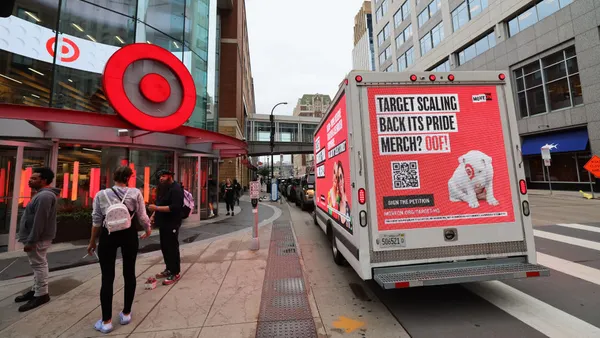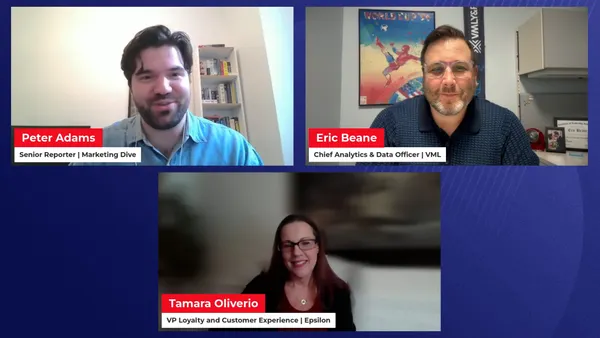What once seemed like science fiction is becoming reality as marketers begin to analyze consumer DNA and other bodily data to deploy campaigns and create products explicitly with an individual's unique characteristics in mind.
Many of these efforts are in very early stages, like plans for a restaurant in Japan that cooks up meals based on each diner's DNA sample and urinalysis. Given that this is still an untested marketplace, marketers who embrace genetic testing could find themselves navigating uncharted waters when it comes to issues like privacy and finding reliable partners. In late April, uBiome, which offers microbiome tests, was raided by the FBI on allegations it was overbilling patients. Just a month earlier, L'Oréal had announced a partnership with uBiome to create more personalized skincare programs. Now, uBiome's co-founders are on administrative leave, and the company has suspended some operations, according to a CNBC report. Additional questions about the company continue to emerge, such as its use of stock photos for testimonials and the age of one of the founders. L'Oréal did not respond to requests for comment, and the current status of its program is unknown.
Despite setbacks like this, the potential to make product development and marketing more personalized could be a strong lure that outweighs the negatives for both consumers and marketers, with experts predicting that personalization of products and services will continue to grow.
"I don't think this is going to be a Wild, Wild West," Julio Hernandez, principal of KPMG's U.S. customer advisory solutions and Global Customer Center of Excellence lead, told Marketing Dive. "I don't think people are going to allow it to be."
Singled out
There's clear interest in DNA analysis for personal use, which could pave the way for consumers being willing to share similar information with marketers. Use of direct-to-consumer genetic tests has been expanding with more than 250 players now in the market and sales projected to exceed $1 billion by 2020, up from $300 million in 2014, according to a KPMG study. In a survey of 2,000 consumers, 60% of respondents said they'd be willing to use a testing kit, with 30% reporting they'd likely take advice from the service.
Hoping to pair consumers with products and marketing they will enjoy more — and save time and money in the process through the elimination of trial and error — several marketers are already exploring taking data mining to a whole new level of personalization by leveraging DNA and other information provided by the body.
The Sushi Singularity Tokyo restaurant, slated to open in 2020, will mail a health kit to those who make a reservation that asks for a DNA sample, urinalysis and enterobacterial flora examination. From the results, the customer will be given a Health ID that chefs will use to enhance meals. Dentsu, the global communications firm based in Japan, is a core entity in the multidisciplinary Open Meals project that's behind the launch.
Nestlé, which has a sizable nutritional supplement business, has been testing the Nestlé Wellness Ambassador program in Japan. The program uses DNA and blood tests, along with an artificial intelligence-driven app through which participants send photos of the foods they eat to receive recommendations for food supplements and lifestyle changes, and to be alerted to potential health threats.
EpigenCare, a winner of Johnson & Johnson's Innovation Labs contest for biotech beauty companies last year, is piloting Skintelli, an epigenetic test to assess skin quality that will be used to match an individual with products on the market that meet particular skin needs. The at-home test kit requires consumers to press an adhesive strip to collect skin cells from the face. Artificial intelligence and blockchain technologies are used to make recommendations.
Balance of trade
Proper use of DNA and other bodily data could provide a true benefit, enabling marketers to step up their game, Hernandez told Marketing Dive. However, it will be important to proceed carefully given the sensitivity of the information. Using personal data in business relationships comes with an assumed "permission" given by the consumer to use their information in expected and anticipated ways, and a "presumption" that it will be used only in those ways, he noted.
"If a consumer sees the company start to move out of its swim lane, there could be backlash," said Hernandez.
The majority of consumers — 75% — are willing to provide data in exchange for greater personalization, better products and services or other benefits, KPMG found in its Me, My Life, My Wallet study on trust and data. But there's also some queasiness, as slightly more than half of consumers are very concerned about identity theft and 72% don't trust anyone with their social media data, according to KPMG's research. Moreover, the trepidations have gotten worse, with 47% of consumers saying they feel more anxious than last year. Millennials, at 51%, are more skittish than baby boomers at 36%.
"Marketers may actually be able to do better product matching."

Julio Hernandez
KPMG, Principal, U.S. customer advisory solutions and Global Customer Center of Excellence lead
A key takeaway from the research is that consumers want to be in control of their data.
"No one is going to give DNA over to a company without explicit expectations," Hernandez said.
In addition to privacy concerns, marketers should take into consideration scientific accuracy and the psychological effects on consumers of the information they receive. Thirty-four percent of people surveyed by KPMG who indicated they were willing to use a testing service expressed concern over discovering something about themselves they'd rather not know.
Given the sensitivity of the data involved in DNA analysis, marketers using biological data will be held to the same and possibly more stringent standards than other data marketers and could even be considered a "special class," Orson Lucas, advisory managing director at KPMG Cybersecurity, told Marketing Dive.
To thwart bad actors, the industry should think proactively and be aware of the evolving regulatory landscape, where data privacy is becoming a bigger focus with new rules like the European Union's GDPR and California's Consumer Privacy Act, which goes into effect next year. Similarly, KPMG's Hernandez referenced changes brought about in healthcare information management due to implementation of HIPAA requirements a few years ago that marketers should be aware of.
One area, in particular, that could open the door to potential privacy concerns and regulatory scrutiny is how this data is shared with third parties.
"When you think about privacy considerations [third-party sharing] is certainly going to be at the top of the list," Lucas said.
But if marketers can figure out how to properly use DNA data, the benefit for consumers and marketers could be hard to resist.
"Marketers may actually be able to do better product matching," Hernandez said.












